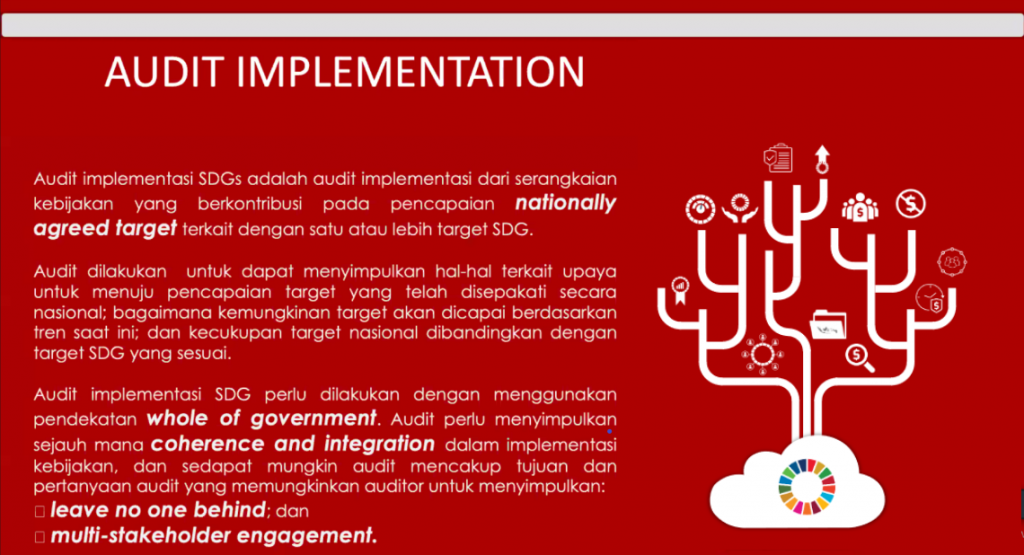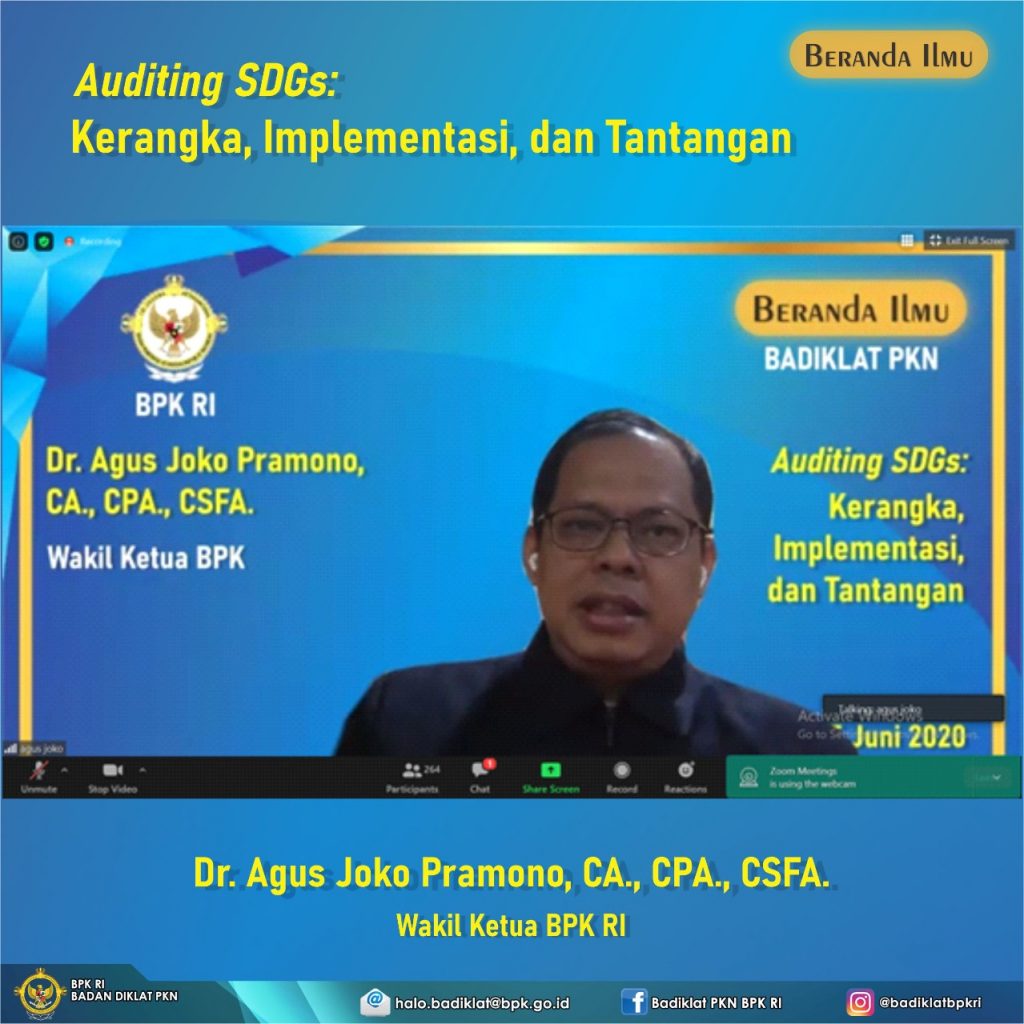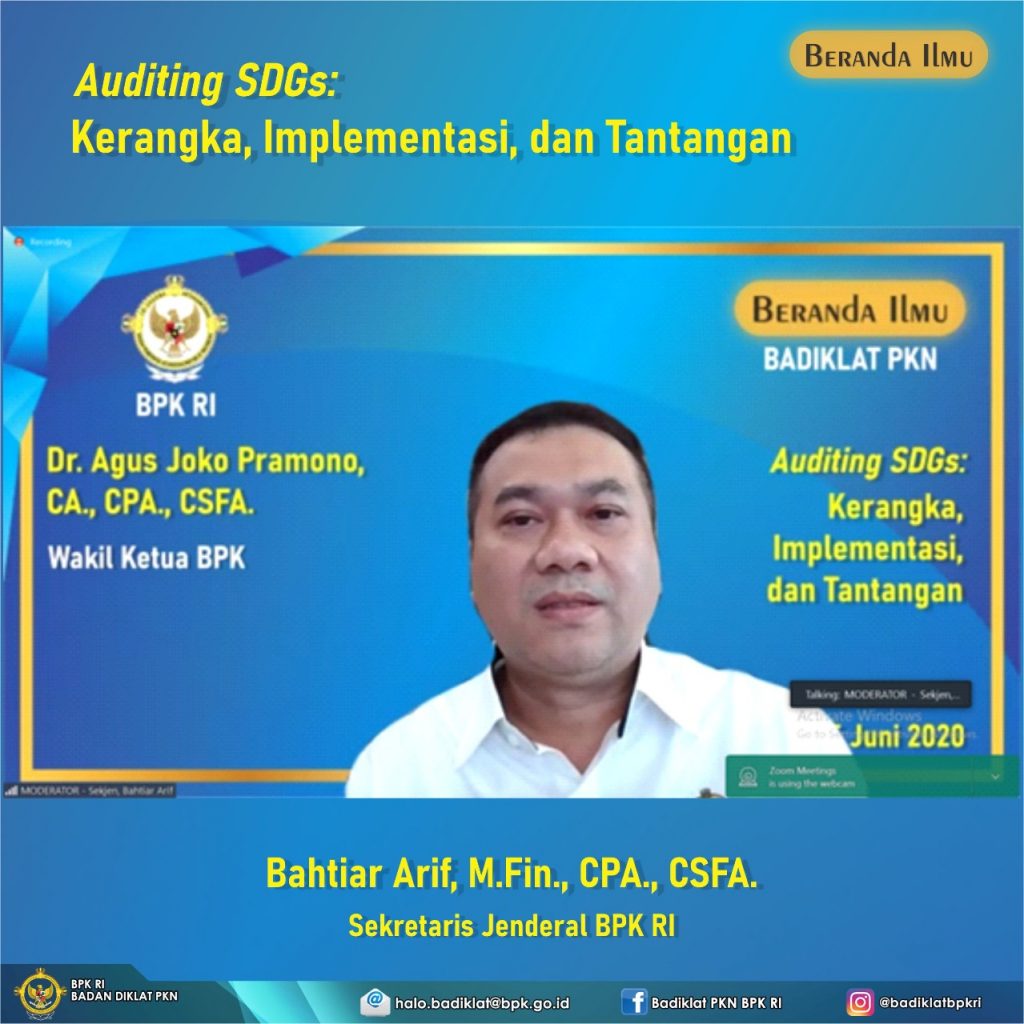As a form of commitment of the BPK RI Training Institute of State Finance Audit (Badiklat PKN) in fulfilling employee competency development and facilitating the sharing of experiences of Board and High Level Officials of BPK, Badiklat PKN is holding “The Home of Knowledge” event, a knowledge sharing forum that presents keynote speakers, namely BPK’s Board, Middle Level Management, and Lower Level Management, for BPK RI employees. On this occasion, the guest speaker was the BPK Vice Chairman, Dr. Agus Joko Pramono, CA., CPA., CSFA. and acted as moderator was the BPK Secretary General, Bahtiar Arif, CPA., CSFA.
BPK Vice Chairman revealed that the Sustainable Development Goals (SDGs) are a program launched by the United Nations (UN) as the world agenda for the benefit of people and the world. To support the program, it requires high leadership awareness and the role of auditors regarding the importance of the SDGs in promoting transparency and accountability. For this reason, the workshop discussed the framework, implementation and challenges of SDGs Auditing in Indonesia.

Source: Slide Presentation material BPK Vice Chairman, Auditing SDGs, 15 Juni 2020
Starting this workshop, the BPK Vice Chairman began with interrelatedness of purpose that has been done by the International Organization of Supreme Audit Institutions (INTOSAI) for each Supreme Audit Institution (SAI) that contributed to the SDGs. There are 4 objectives presented by INTOSAI in the International Congress of Supreme Audit Institutions (INCOSAI) in 2016 that are still agreed to date: 1. Conduct a country’s Preparedness audit 2. Conduct an implementation audit 3. Improve governance in government 4. SAI become the role models or organizations become role models for the implementation of SDGs.
A preparedness audit carried out by BPK in 2018 by AKN II (Auditorate II). In conducting preparedness audit, the framework audit offered by INTOSAI is auditing 2 frameworks consisting of policy frameworks and data frameworks. The criteria contained in this framework are studied to see whether it has been integrated between 3 environmental, social and economic pillars. The final result of this preparedness audit is that policymakers are not integrated, incoherent, and lack of framework data.
In this workshop the raised discussion focus was the implementation audit that has been carried out by the Indonesian government. For this reason, it is necessary to look at the BPK organizational level, which consists of: 1. Form a team to conduct SDGs audits, 2. Determine SDGs topic audits, 3. Determine audit methods, 4. Professional Capacity Development, 5. Use of Technology, 6. Collaborate with institutions that have mastered SDGs, 7. Deliver and implement SDGs internally and to stakeholders, 8. Challenges and expectations. In addition to apply the implementation audits, the auditors need to understand a number of important points, such as: 1. Nationally agreed or national target 2. Whole of government or conducting systemic assessments 3. Leave no one behind principle or no community is left behind and 4. Auditing multi stakeholder engagement or audit that involving multi stakeholders. 
Source: Slide Presentation material BPK Vice Chairman, Auditing SDGs, 15 Juni 2020
In his presentation, the BPK Vice Chairman also said that the Auditing SDGs is a new science and its development is very rapid. So he hopes that the auditors play an active role in exploring information and knowledge related to this SDGs Audit by reading materials from the INTOSAI Development Initiative (IDI), following the dissemination of these SDGs from various media both print and online and to link the knowledge that has been obtained with the conditions in BPK.
The workshop, conducted by the distance learning method, was attended by 259 participants consisting of Middle Level Management, Lower Level Management, Administrator Officers and High and Middle Level Functional Officers. This is in line with what Ki Hajar Dewantara said, that anyone can become a teacher, and make any place as a space to gain knowledge. Ending the workshop activities, BPK Vice Chairman hopes that the participants present will gain knowledge about Auditing SDGs and explore this audit model so that it can be applied in carrying out the audit tasks related to future SDGs.

.


